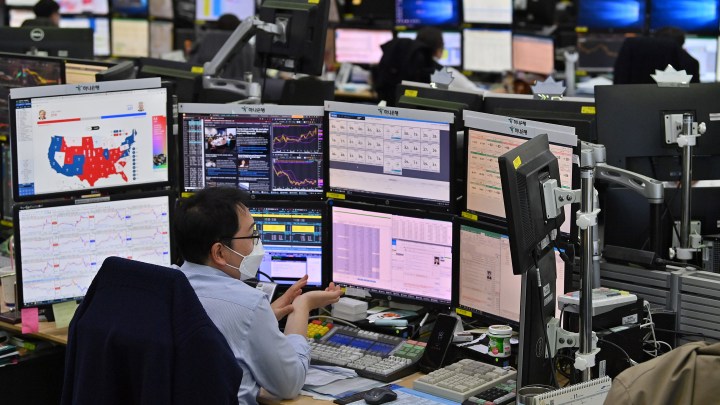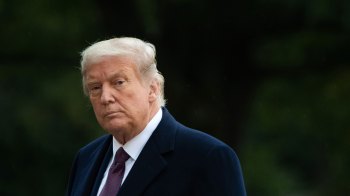
Stock futures, oil prices bounce after Trump falsely asserts he won

U.S. futures bounced and European shares were lower Wednesday after President Donald Trump, in an early morning appearance at the White House, made premature claims of victories in several key states.
Wall Street futures were jolted by the news but recovered some lost ground. Oil prices likewise rebounded. Investors appeared to be adopting an optimistic stance on the election’s still undecided outcome.
Dow futures were flat after falling 1.5% following Trump’s announcement. The S&P 500 future contract rose 0.6% after dropping 1.1%.
Trump said, “Frankly, we did win this election.” That assertion did not match the results and information available to the AP. At the time, neither candidate had secured the 270 electoral college votes needed to claim victory.
Trump said he would take the election to the Supreme Court. It was unclear exactly what legal action he might try to pursue, but a contested election is among the worst scenarios anticipated by investors hoping for an end to the uncertainty after a long, bruising campaign.
As of 4 a.m. Eastern time, Trump and his Democratic challenger Joe Biden still were locked in tight races in a handful of battleground states.
Most polls had predicted a Biden victory, and many investors took the forecasts of a so-called “blue wave” of Democratic Party wins as a signal that the U.S. economy might soon get a big, fresh infusion of help. But with the race too close to call, some analysts said they also might be reassured by the prospect for a continuation of Trump’s pro-market stance.
“Markets seem to be pricing in better chances for Trump, or at least a smaller chance of a blue wave,” Stephen Innes of Axi said in a commentary.
“On the one hand with the fiscal implications of a Biden win/blue wave that’s a bit of a surprise -– on the other Trump is widely considered more market-friendly, so one can see how it nets out a small positive,” Innes said.
Germany’s DAX lost 0.9% to 11,981.39, while the CAC 40 in Paris lost 0.3% to 4,793.20. Britain’s FTSE 100 edged 0.2% lower, to 5,778.05.
In Asia, the Nikkei 225 in Tokyo advanced 1.7% to 23,695.23 on Wednesday, while the Kospi in Seoul added 0.6%, to 2,357.17. India’s Sensex surged 0.9% and the S&P/ASX 200 in Sydney lost 0.1% to 6,062.10.
The Hang Seng in Hong Kong declined 0.2% to 24,893.59, while the Shanghai Composite Index edged 0.2% higher, to 3,277.44.
The 2016 election rattled world markets as results showed Donald Trump was running ahead of Hillary Clinton. The S&P 500 slumped early the next day, but ended 1.1% higher.
The large number of Americans who voted early means the result of this presidential election might not be known for days. A contested election would inflict still more uncertainty on markets buffeted by bouts of volatility as the coronavirus pandemic has waxed and waned.
History shows stocks tend to rise regardless of which party controls the White House. But investors are most eager to see a clear winner from this election, even if it takes some time.
The makeup of the Senate is another unknown overhanging the markets. Another is the timing of a possible COVID-19 vaccine.
Investors and economists have been clamoring for a renewal of stimulus since the expiration of the last round of supplemental benefits for laid-off workers and other support approved earlier by Congress.
Many professional investors say what matters most is what happens with the pandemic and whether a vaccine can arrive soon to help the economy heal.
Apart from the election, investors are awaiting the Federal Reserve’s decision on its interest-rate policy on Thursday. Its earlier moves to slash interest rates to record lows and to step forcefully into bond markets to push prices higher have helped Wall Street soar since March.
The Labor Department is also releasing its jobs report for October on Friday, where economists expect to see another slowdown in growth. Meanwhile, corporate earnings reports are showing lower profits in the last quarter, but not as miserable as Wall Street had feared.
In other trading, U.S. benchmark crude oil gained 11 cents to $37.77 per barrel in electronic trading on the New York Mercantile Exchange. Brent crude, the international standard, picked up 19 cents to $39.90 per barrel.
The dollar bought 104.93 Japanese yen, down from 104.95 late Tuesday. The euro weakened to $1.1675 from $1.1718.
There’s a lot happening in the world. Through it all, Marketplace is here for you.
You rely on Marketplace to break down the world’s events and tell you how it affects you in a fact-based, approachable way. We rely on your financial support to keep making that possible.
Your donation today powers the independent journalism that you rely on. For just $5/month, you can help sustain Marketplace so we can keep reporting on the things that matter to you.


















